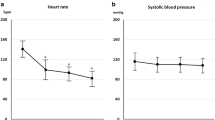Summary
Atrial fibrillation is in 20–50% the most frequent dysrhythmia after coronary artery bypass grafting (CABG) and a possible cause for hemodynamical complications and prolongation off the medical treatment in patients. Therefore, the effect of β-blocking with metoprolol for prevention of supraventricular arrhythmias (SVA) was investigated in a prospective and randomized trial. 200 patients after CABG were randomized in a drug and control group (average age 63.2 years, 154 male, 46 female). Patients of the drug group (n=100) were treated with metoprolol (1mg/kg/BW) beginning on day one after operation, whereas patients of the control group (n=100) received therapy only in case of occurrence of atrial fibrillaton. ECG, blood pressure, and electrolyte concentrations were measured regulary until the tenth day after surgery. Reasons for exclusion were an ejection fraction (< 30%, SA- and AV-block or simultaneous application of epinephrine and metoprolol. There were no significant differences between the patients of drug and control group with respect to age, sex ejection fraction, previous medication, number and type of bypass grafts, cardiopulmonary bypass time, and perioperative ischemic events. However, a statistically significant difference was seen in the occurrence of supraventricular arrhythmias in both groups, 4 patients of the therapy group (4%) in contrast to 37 patients of the control (37%) developed supraventricular arrhythmias during the postoperative observation period (p<0.0001). Both groups differed in total time of hospital stay by 1.5 days (control group: 9.83±2.88 days; drug group: 8.42±2.81 days), which was statistically significant (p<0.05). All patients of the drug group could be discharged with a stable sinusrhythm, whereas 7 patients of the control group were discharged with persistent atrial fibrillation. The difference was statistically significant as well (p<0.01). Neither typical side effects of metoprolol, nor AV-blocks, bradycardia (f<60/min) or symptoms of low blood pressure could be observed. The conclusion of this trial is a recommendation for a preventive application of 50mg metoprolol/day after coronary artery bypass surgery, which can reduce the incidence of SVA as well as the hospital stay statistically significant.
Zusammenfassung
Tachykardes Vorhofflimmern ist mit 20–50% die häufigste Herzrhythmusstörung nach Bypass-Operationen und kann zu hämodynamischen Komplikationen im postoperativen Verlauf führen. In einer prospektiven, randomisierten Studie wurde die Wirksamkeit von Metoprolol in der Prävention der postoperativen supraventrikulären Arrhythmien untersucht. 200 Koronarpatienten (Alter im Mittel 63,5 Jahre, 154m/46w) wurden in einer Therapie- bzw. in eine Kontrollgruppe randomisiert. Patienten der Therapiegruppe (n=100) wurden ab dem ersten postoperativen Tag mit 50 mg Metoprolol behandelt, in der Kontrollgruppe (n=100) erhielten die Patienten primär keine präventive antiarrhythmische Therapie. EKG, Blutdruck und Serumelektrolyte wurden regelmäßig bis zum 10. postoperativen Tag kontrolliert. Ausgeschlossen wurden Patienten mit reduzierter LVEF (<30%), SA- und AV-Blockierungen und Asthma bronchiale. Es ergaben sich in Hinsicht auf Alter, Geschlecht, LVEF, präoperative Medikation, Art und Anzahl der Bypassgrafts, Operations- und Bypasszeit sowie perioperative Myokardischämien keine signifikanten Unterschiede zwischen den Gruppen. Signifikant unterschiedlich war jedoch das Auftreten supraventrikulärer Arrhythmien in den beiden Gruppen, 4 Patienten der Therapiegruppe (4%) gegenüber 37 Patienten der Kontrollgruppe (37%) zeigten im postoperativen Beobachtungsintervall Vorhofarrhythmien (p<0,0001). Die durchschnittliche Verweildauer in stationärer Behandlung betrug in der Therapiegruppe 8,42±2,81 Tage versus 9,83±2,88 Tage in der Kontrollgruppe, der Unterschied zwischen den Gruppen war signifikant (p<0,05). Alle Patienten der Metoprolol-Gruppe verließen das Krankenhaus in stabilem Sinusrhythmus, wohingegen 7 Patienten der Kontrollgruppe mit supraventrikulären Arrhythmien entlassen wurden, der Unterschied zwischen den Gruppen war ebenfalls signifikant (p<0,01). Nebenwirkungen der Metoprolol-Therapie wurden nicht beobachtet, insbesondere traten keine AV-Blockierungen, Bradykardien oder symptomatische Hypotonien auf. Zusammenfassend kann festgestellt werden, daß die präventive Therapie mit Metoprolol (50mg/Tag) die Inzidenz supräventrikulärer Rhythmusstörungen nach Bypass-Operationen sowie den stationären Aufenthalt nach Operation signifikant verringert und somit bei fehlender Kontraindikation als Routinetherapie empfohlen werden kann.
Similar content being viewed by others
Author information
Authors and Affiliations
Additional information
Eingegangen: 2. September 1998, Akzeptiert: 6. Mai 1999
Rights and permissions
About this article
Cite this article
Wenke, K., Parsa, M.H.A., Imhof, M. et al. Wirksamkeit der Metoprolol-Therapie in der Prävention supraventrikulärer Arrhythmien nach koronarer Bypass-Operation. Z Kardiol 88, 647–652 (1999). https://doi.org/10.1007/s003920050340
Issue Date:
DOI: https://doi.org/10.1007/s003920050340




